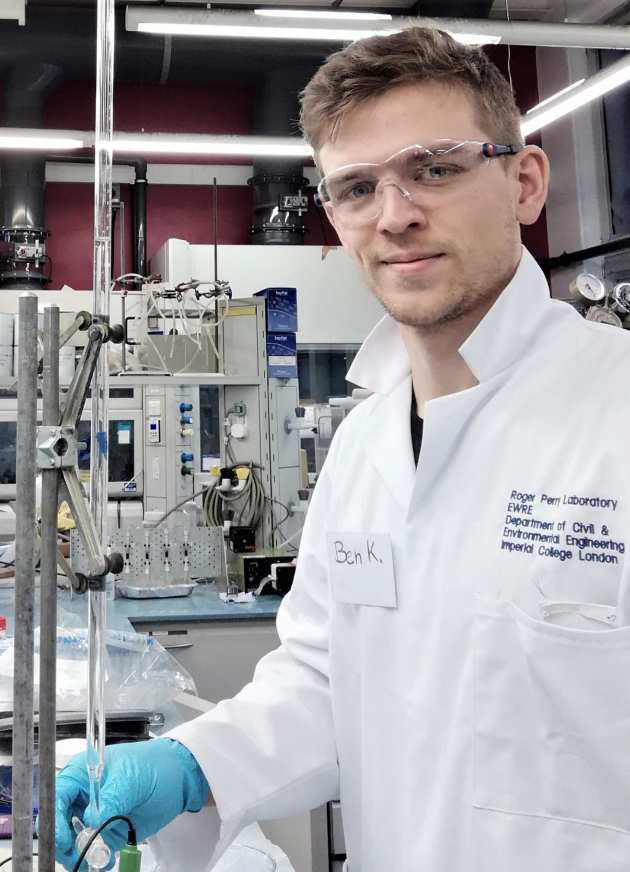2017 PhD Candidate - Ben Krueger
 EWRE Section
EWRE Section
Supervised by Dr Geoff Fowler and Professor Michael Templeton
Benedict completed his undergraduate studies at the Technische Universität Darmstadt in Germany before coming to Imperial to study for a Master’s degree in Environmental Engineering. He then joined the Environmental and Water Resource Engineering section to undertake a PhD which is funded through a private donation to Imperial College.
Why did you decide to do a PhD in the Department of Civil and Environmental Engineering?
There are three main reasons that led me to doing a PhD in this department. Firstly, because this project was an opportunity to work on a topic that I am passionate about at one of the world’s top universities. Secondly, because I had already met excellent academics and students during the MSc with whom I was looking forward to working with. And thirdly, because my supervisors were extremely supportive in acquiring the necessary funding to pursue my doctoral studies.
Tell us about your PhD research
4.5 billion people do not have access to safely managed sanitation. On-site sanitation such as pit latrines are widespread, and their contents (faecal sludge) include large amounts of environmental pollutants and pathogens. Therefore, the management of faecal sludge is critical. Sludge treatment is one step in the prevention of adverse environmental and health effects.
My research looks at novel approaches to faecal sludge treatment which can recover resources and render it safe for reuse. Recovery options include the production of soil amendments utilising the high levels of nutrients and carbon in the sludge, as well as the production of sludge-derived solid fuel.
What impact do you hope you research will have/what do you hope your research will lead on to?
The choice for suitable sanitation technologies will always depend on local conditions. I hope that my work will inform engineers and decision makers working in sanitation to make the right decisions, and that this may ultimately improve the lives of communities burdened by poor sanitation.
Does your research involve working with collaborators outside of the Department? If so who and why?
Yes, I have actively sought collaborations with companies and researchers outside of Imperial College. This has included work with an American company designing and building faecal sludge treatment processes which has allowed me to take a very applied approach. More recently, I am partnering with a research group in South Africa who are renowned in this field of research and are facilitating my sampling campaign.
What is a typical week like for you?
A typical week will include a lot of hours making sense of data sets, reading scientific publications and conducting experiments. This would be complemented by occasional supervisor meetings and work as a teaching assistant. Catching some fresh air on the Queen’s Lawn over lunch and using Imperial’s sports facilities is a great way to clear your mind. However, the atypical weeks are one of the things I particularly appreciate about my PhD. During my time at Imperial the nature of my work has taken me to places such as Nepal, India and South Africa.
How have your skills developed, both professional and personal?
The professional skills I am gaining are the ability to manage my own project and to successfully collaborate with the project partners. It continues to strengthen my ability to work in an international context as well as the more scientific skills surrounding experimental work and data analysis. From a personal perspective the research really challenges my ability to work independently and to strike the right work-life balance.
What do you enjoy most about being a PhD in the Department?
Being part of the EWRE section is a real pleasure because it gives you the sense of being part of a group that is doing something meaningful. The environmental state of our world calls for action on so many levels. This is a great way of getting involved in the things that really matter.


